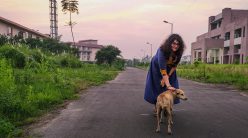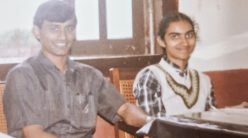Subramony Mahadevan, a former faculty member at the Department of Developmental Biology and Genetics, was diagnosed with Parkinson’s disease in 2009. In this personal essay, he reflects on his experiences of coping with the condition. This essay was first published in the Deccan Herald on 9 September 2023 and is being republished in CONNECT with permission.
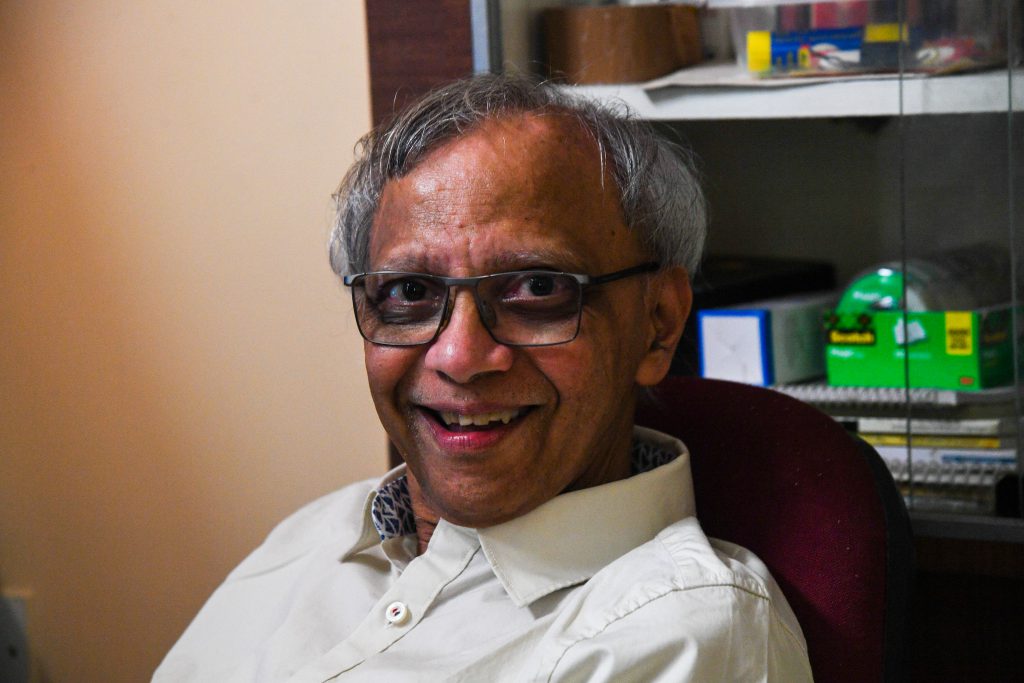
One of the great perks of working at the Indian Institute of Science, Bengaluru, was the serenity of the campus. On crisp winter days, I preferred to walk rather than drive the 3 km from my Malleswaram home to my lab, where I taught genetics and molecular biology. The only indications of the impending doom were that even a small stone on the way could trip me, I could not catch a flyer while playing cricket, and beating a rhythm with my hands became excruciatingly difficult.
My Parkinson’s disease (PD) was diagnosed serendipitously at 55. One bright spring morning in 2009, a colleague noticed me walking down the road on the campus. We had planned to have tea at the Faculty Club. She asked me why I was dragging my left foot and holding my left arm stiffly. I might have had a stroke, she thought, and suggested that I see a doctor. I was taken aback and fixed up an appointment at the Institute’s Health Centre. The moment I walked into the doctor’s consultation room, she gasped and said, “Oh my god, you are showing classic symptoms of PD.” She wrote a referral for a neurologist at a hospital nearby and said, “See him today.”
The consulting neurologist confirmed the diagnosis. The news was obviously devastating for my wife, Usha; I remained calm as the full impact of the doctor’s pronouncement had yet to sink in. Soon, second and third opinions confirmed PD, a brain condition that causes slow or involuntary movements, rigidity, trouble walking, and imbalance.
It is a progressive condition with currently no cure. So my life is split into On-time and Off-time. On-time is when the medicine is working – I can walk, sit and talk normally. Off-time is when the medicine wears off. I look slow – like a 45 rpm LP record playing at 33 rpm. I move with great difficulty – walking from the main road to my flat can take half an hour.
It is a progressive condition with currently no cure
First decade
L-DOPA is currently the best medication available for PD, but since my symptoms were mild, my first doctor felt we should save it for a rainy day. He prescribed medications to allow for low levels of dopamine (the hormone that helps with smooth movements) to function optimally and to ease tremors and stiffness. My discomfort increased as the days went by, but my colleagues and graduate students assured me that my mind was as sharp as ever.
I was getting somewhat disillusioned with my current neurologist and sought another on the recommendation of one of my PhD students. I now felt I was in the presence of a professional whose bedside manner was as good as his reputation. Despite his busy practice, he went through my family history and prepared a medical record in case I was to move out of Bengaluru and consult other doctors. He introduced me to L-DOPA as he felt the rainy day was fast approaching. This was two years after my diagnosis.
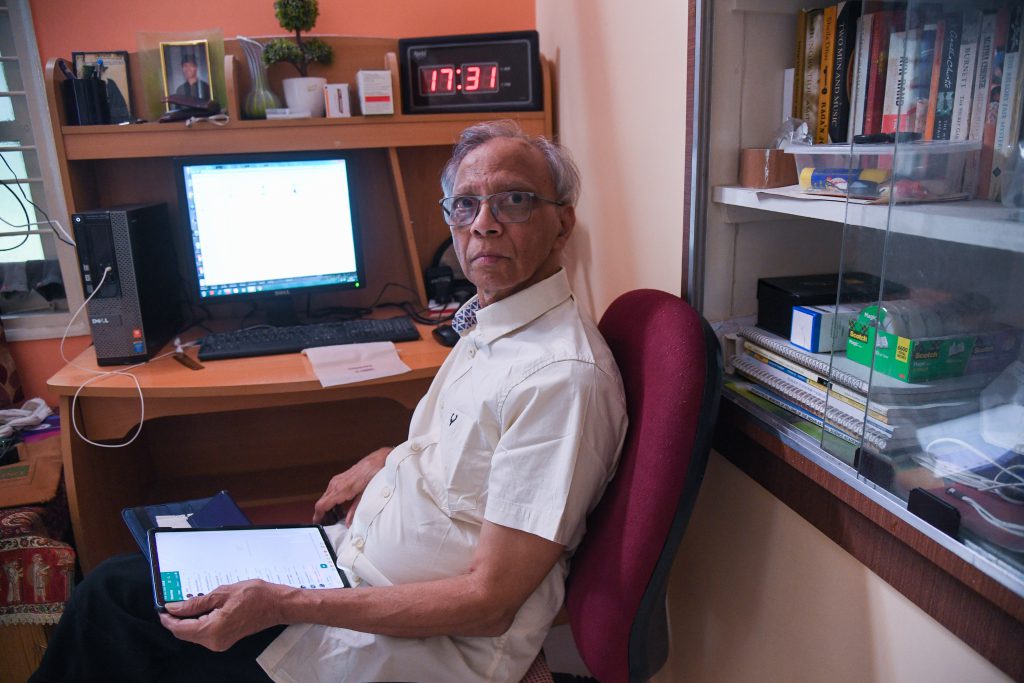
I could manage my academic life until July 2019 when I was set to retire, but I had stopped driving. Over the next year, I could go grocery shopping but only during the On-time. My weight began dropping. Speech became strenuous. Stiffness and full-body fidgeting, dyskinesia as it is called, increased. More medicines were added to keep the On-time longer. Overall, I was functional at home, but going out alone was risky.
Another type of intervention became necessary, and we zeroed in on Deep Brain Stimulation (DBS), an invasive procedure to implant electrodes into the brain. They often call it the pacemaker for the brain. It specifically alleviates the motor symptoms of PD. We set 20 May 2022 as the D-day, or DBS Day as I put it.
Brain pacemaker
One day prior to the surgery, an MRI of my brain was taken. It was to act as a sort of Google map of my brain. On surgery day, a stainless-steel frame was fixed to my tonsured head like a crown, except that there were no precious stones but only screws to keep it tightly fixed to the scalp. Of course, I was given local anaesthesia. But the screws went into my ears without any anaesthetic and the doctor told me with a straight face that if the pain in both my ears was the same, things were fine. Once the electrodes were positioned correctly, I was given a general anaesthetic and the surgeon gathered the wires into two bundles and connected them to the battery implanted below the left collarbone under the skin. One of the local anaesthetic shots was injected over my right eyelid and I could barely open it after the surgery. I remember I looked like Harry Potter in one of his disguises while escaping from Lord Voldemort.
The battery was not turned on until a week after, as the doctor wanted all inflammation near the insertion points to recede so that there was no interference with the electrical signals. At the same time, my medicines were cut down as he wanted to determine the best levels for me. These were difficult days. I needed help for everything including brushing my teeth and tearing chapatis as my fingers had no strength. Even turning over in my bed while sleeping was impossible.
It has been over 15 months since the Rs 19 lakh surgery started pumping 4 millivolts in my brain every day. Overall, the setup is not too much of a bother. If I go to metro train stations, I carry an advisory from my doctor not to allow a hand-held metal detector over my body as it can ‘interfere’ with electrical stimulation. I do need to recharge the battery buried in my chest for at least an hour every week. For that, I hang a ‘power pack’ on my chest and sit still for the inducing fields to do their work.
It has been over 15 months since the Rs 19 lakh surgery started pumping 4 millivolts in my brain every day
DBS is supposed to extend the On-time and reduce medication. Has it helped or was it an expensive error of judgement? The answer is not a simple ‘Yes’ or ‘No’.
Life after DBS
DBS has improved my appetite and stabilised my weight, which I was losing at an alarming rate because of dyskinesia. It is another thing that I end up gobbling up the sweetest items in the house and I am hyperactive during On-time, which my wife doesn’t find too amusing.
But the Off-time seems to be getting longer and more crippling by the day. That is frustrating as in the middle of writing an article or making coffee, I have to stop, pop my pill and wait to switch ‘On’. The medicines kick in within 10 minutes on an empty stomach, like after waking up in the morning. After lunch, it can take 30 minutes. Just as fuel is wasted if an automobile stops and restarts frequently, these disruptions result in loss of concentration and motivation. I have grown impatient, irritable and angry because of the disruptions, which are in direct contrast to the qualities my students and colleagues used to admire me for. My tolerance for ‘low standards’ in people has plunged as also for inanimate objects such as slippers that disappear when you need them. I am aware of my mood swings and I make it a point to apologise to my wife. Sometimes, my son, who lives in the USA, intervenes. But my doctor insists that I am doing fine!
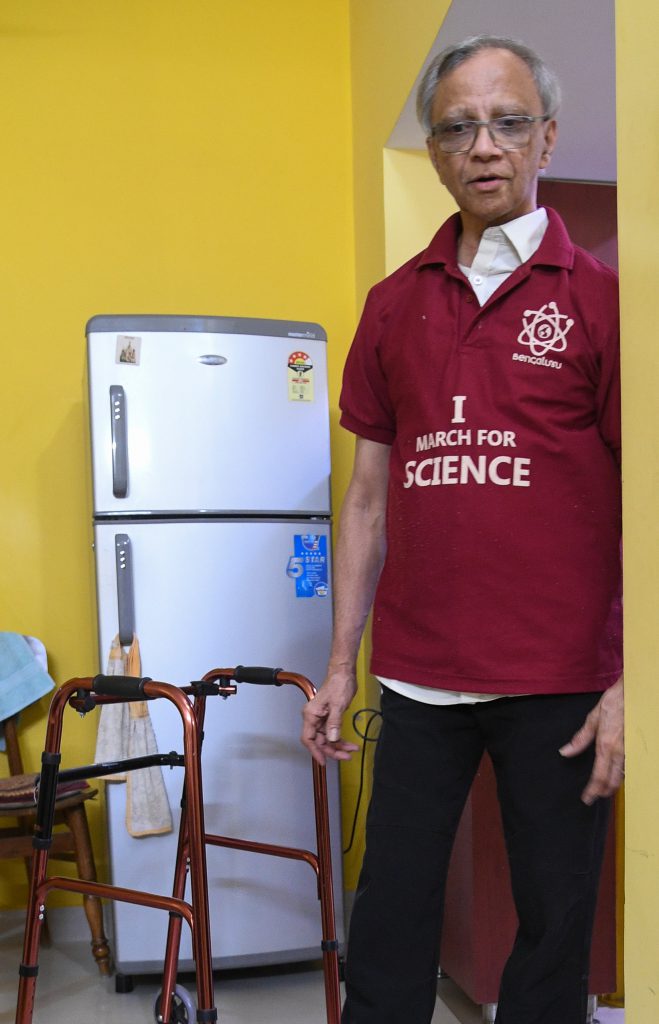
One dose of medication ideally keeps me ‘On’ for about three hours and I am advised not more than five doses a day. Transferring money online, keying in an OTP, and taking showers are strictly On-time tasks. But admittedly, I tend to overspend my On-time on social media, catching up with PG Wodehouse fans, school friends, and fellow PD patients.
During Off-time, my doctor has asked me to lie down, though sometimes, I manage to stand in the kitchen and do the dishes with my wife. I also use this downtime to compose email messages, finish a prose piece, and plan my day in my head.
But a mistake during Off-time can cause much hurt and embarrassment. There were some ghastly photos of my face after I fell on a wash basin. Instead of sending them to my doctor-brother to assess the damage, I put them up on my WhatsApp status because my hands were shaking. I was flooded with queries from well-wishers.
Whether I am ‘On’ or ‘Off’, my wife never leaves me alone in the house. She consults at a bioinformatics company and if she needs to be away for work for a few hours, she arranges a caretaker for me. Stepping out in the city alone is a no-no. Dug-up roads, speeding buses – I am up against a lot. I did risk it all to get some snacks one day and my wife, understandably upset, admonished me. I like my clothes sun-dried, but to be on the safe side, I can’t go to the terrace to fetch them.
Stepping out in the city alone is a no-no. Dug-up roads, speeding buses – I am up against a lot
Caught off-guard
The discomfort that I go through during the Off-time is a lot more than my inability to move. The mind also slows down and everything feels like I am stumbling through a fog. JK Rowling’s magical world of Harry Potter is the best analogy to describe my plight. It feels like I am being tormented by dementors who want to suck the happiness out of my life. I have to use all my energy and recall every happy moment in my life to conjure up a Patronus charm to fight them.
Gait-freezing is the most difficult part. It is the total inability to take a step forward. This is dangerous at my age. I am 69. It can lead to a loss of balance, a fall, and subsequently a fracture. Many things contribute to gait-freezing in my case. One of them I have named the ‘Cinderella Syndrome’, that is, any kind of anxiety that forces me to do something to a deadline, like hurrying to catch a flight. Going into a crowd, stopping and making a turn, and crossing a door or elevator are other such scenarios.
I can overcome gait-freezing when I am not in a rush and even take the stairs. I guess it is all in the state of the mind, and I have devised a strategy. I call it ‘kick the trash-can’. I have a mid-size plastic trash-can that is light yet steady. When my gait freezes, I gently kick the trash-can. My aim is to kick the can and not walk! This way, by fooling my brain, I can walk around the house slowly.
Sometimes, I don’t even realise when the Off-time kicks in. It often happens when I am engrossed in a stimulating activity, like watching a movie or researching online. This ignorance is bliss only if I don’t move. When I do, I end up falling on the bed or parapet. My body is a museum of bruises and concussions. My reading glasses need fixing every now and then, and sometimes, my teeth too.
Once, my students had come home to discuss Darwin’s theory of evolution which was deleted under the NEP (National Education Policy). I froze mid-discussion. They understood and left. I was shy of giving lectures and attending seminars for reasons like this, but I have managed to fight off these inhibitions now.
Being prepared counts. For watching the Asia Cup matches, I kept my medicines, a glass of water, and my walker next to me because these games were past my wife’s bedtime. Grab bars and safety sheets have also been fixed in the bathroom to minimise slipping.
There are day-to-day variations in my response to medication and my general outlook to life. Still, every morning, I wake up to greet the day happily and with hope. I have learnt to live fully in whatever little time I am active, and I keep negative thoughts at bay. When I got a letter of acceptance for my article from J Biosciences, I was on cloud nine! Similarly, I was delighted when I got an email from Deccan Herald about publishing my journey with Parkinson’s.
Humour is another way to cope, and I find solace in PG Wodehouse’s writing, especially his short story: The Man Who Gave Up Smoking.
I think the day I am unable to laugh at myself, I can safely conclude that instead of kicking the trash-can, I have kicked the bucket!
With input from Barkha Kumari, Deccan Herald

